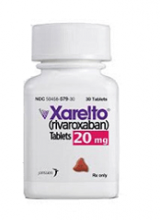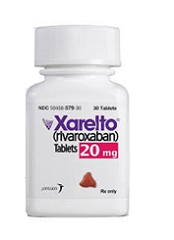User login
The companies developing rivaroxaban have announced an early end to the phase 3 NAVIGATE ESUS study.
In this trial, researchers were evaluating the efficacy and safety of rivaroxaban for the secondary prevention of stroke and systemic embolism in patients with a recent embolic stroke of undetermined source (ESUS).
The study was stopped early after it became evident that rivaroxaban was unlikely to provide a benefit over aspirin.
Results showed comparable efficacy between rivaroxaban and aspirin and an increase in bleeding in the rivaroxaban arm, although bleeding rates were considered low overall.
The NAVIGATE ESUS trial enrolled 7214 patients from 459 sites across 31 countries. Patients were randomized to receive either rivaroxaban at 15 mg once daily or aspirin at 100 mg once daily.
The primary efficacy endpoint was a composite of stroke and systemic embolism. The primary safety endpoint was major bleeding according to the criteria of the International Society on Thrombosis and Haemostasis.
A complete analysis of NAVIGATE ESUS data is expected to be presented in 2018.
About rivaroxaban
Rivaroxaban was discovered by Bayer, which is developing the drug with Janssen Research & Development, LLC.
Rivaroxaban is approved for use in more than 130 countries for a total of 7 indications:
- The prevention of stroke and systemic embolism in adults with non-valvular atrial fibrillation and 1 or more risk factors
- The treatment of pulmonary embolism (PE) in adults
- The treatment of deep vein thrombosis (DVT) in adults
- The prevention of recurrent PE and DVT in adults
- The prevention of venous thromboembolism (VTE) in adults undergoing elective hip replacement surgery
- The prevention of VTE in adults undergoing elective knee replacement surgery
- The prevention of atherothrombotic events (cardiovascular death, myocardial infarction, or stroke) after an acute coronary syndrome in adults with elevated cardiac biomarkers and no prior stroke or transient ischemic attack when co-administered with acetylsalicylic acid alone or with acetylsalicylic acid plus clopidogrel or ticlopidine.

The companies developing rivaroxaban have announced an early end to the phase 3 NAVIGATE ESUS study.
In this trial, researchers were evaluating the efficacy and safety of rivaroxaban for the secondary prevention of stroke and systemic embolism in patients with a recent embolic stroke of undetermined source (ESUS).
The study was stopped early after it became evident that rivaroxaban was unlikely to provide a benefit over aspirin.
Results showed comparable efficacy between rivaroxaban and aspirin and an increase in bleeding in the rivaroxaban arm, although bleeding rates were considered low overall.
The NAVIGATE ESUS trial enrolled 7214 patients from 459 sites across 31 countries. Patients were randomized to receive either rivaroxaban at 15 mg once daily or aspirin at 100 mg once daily.
The primary efficacy endpoint was a composite of stroke and systemic embolism. The primary safety endpoint was major bleeding according to the criteria of the International Society on Thrombosis and Haemostasis.
A complete analysis of NAVIGATE ESUS data is expected to be presented in 2018.
About rivaroxaban
Rivaroxaban was discovered by Bayer, which is developing the drug with Janssen Research & Development, LLC.
Rivaroxaban is approved for use in more than 130 countries for a total of 7 indications:
- The prevention of stroke and systemic embolism in adults with non-valvular atrial fibrillation and 1 or more risk factors
- The treatment of pulmonary embolism (PE) in adults
- The treatment of deep vein thrombosis (DVT) in adults
- The prevention of recurrent PE and DVT in adults
- The prevention of venous thromboembolism (VTE) in adults undergoing elective hip replacement surgery
- The prevention of VTE in adults undergoing elective knee replacement surgery
- The prevention of atherothrombotic events (cardiovascular death, myocardial infarction, or stroke) after an acute coronary syndrome in adults with elevated cardiac biomarkers and no prior stroke or transient ischemic attack when co-administered with acetylsalicylic acid alone or with acetylsalicylic acid plus clopidogrel or ticlopidine.

The companies developing rivaroxaban have announced an early end to the phase 3 NAVIGATE ESUS study.
In this trial, researchers were evaluating the efficacy and safety of rivaroxaban for the secondary prevention of stroke and systemic embolism in patients with a recent embolic stroke of undetermined source (ESUS).
The study was stopped early after it became evident that rivaroxaban was unlikely to provide a benefit over aspirin.
Results showed comparable efficacy between rivaroxaban and aspirin and an increase in bleeding in the rivaroxaban arm, although bleeding rates were considered low overall.
The NAVIGATE ESUS trial enrolled 7214 patients from 459 sites across 31 countries. Patients were randomized to receive either rivaroxaban at 15 mg once daily or aspirin at 100 mg once daily.
The primary efficacy endpoint was a composite of stroke and systemic embolism. The primary safety endpoint was major bleeding according to the criteria of the International Society on Thrombosis and Haemostasis.
A complete analysis of NAVIGATE ESUS data is expected to be presented in 2018.
About rivaroxaban
Rivaroxaban was discovered by Bayer, which is developing the drug with Janssen Research & Development, LLC.
Rivaroxaban is approved for use in more than 130 countries for a total of 7 indications:
- The prevention of stroke and systemic embolism in adults with non-valvular atrial fibrillation and 1 or more risk factors
- The treatment of pulmonary embolism (PE) in adults
- The treatment of deep vein thrombosis (DVT) in adults
- The prevention of recurrent PE and DVT in adults
- The prevention of venous thromboembolism (VTE) in adults undergoing elective hip replacement surgery
- The prevention of VTE in adults undergoing elective knee replacement surgery
- The prevention of atherothrombotic events (cardiovascular death, myocardial infarction, or stroke) after an acute coronary syndrome in adults with elevated cardiac biomarkers and no prior stroke or transient ischemic attack when co-administered with acetylsalicylic acid alone or with acetylsalicylic acid plus clopidogrel or ticlopidine.


